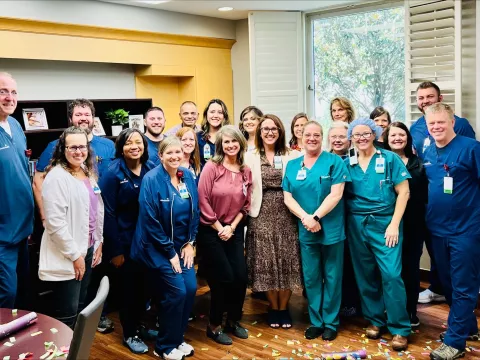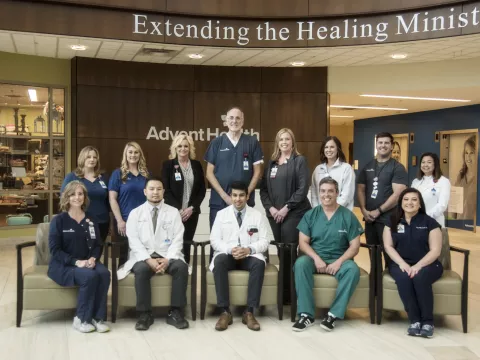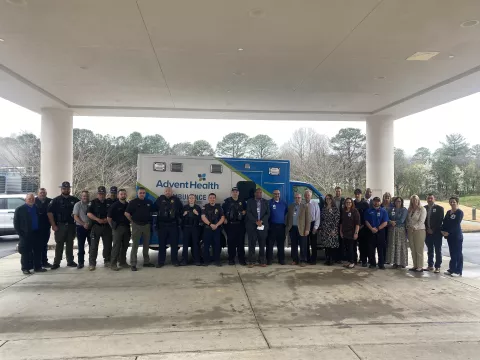- Chelsea Etheridge
Choose the health content that’s right for you, and get it delivered right in your inbox.

Did you know one out of eight men will be diagnosed with prostate cancer in their lifetime? The American Cancer Society (ACS) informs us that prostate cancer is the most common cancer aside from skin cancer for men in the United States. It is also the second most common cause of cancer death among men, with the first being lung cancer. Promoting cancer prevention and health screening education is vital, as men’s health issues can often be overlooked.
For men who are questioning if they should get screened for prostate cancer or other general screenings, the best place to start is to consult with your primary care provider. For prostate cancer, the ACS suggests speaking with your doctor about screening between the ages of 40 to 50 depending on risk factors for prostate cancer, including family history of prostate cancer at an early age (less than 65 years old) and if you are of African American race.
The majority of men with localized, early-stage prostate cancer are asymptomatic. When detected early, prostate cancer can be safely monitored or treated depending on cancer risk. However, if a patient waits until symptoms develop, he is more likely to have advanced disease, which could limit treatment options.
Some of the symptoms of prostate cancer may include the following:
- Back pain
- Blood in urine
- Changes in urine flow/frequency
- Pain while urinating
- Pelvic pain
For a screening, you can expect to receive a prostate-specific antigen (PSA) blood test that analyzes protein levels made by cells in the prostate gland and a digital rectal exam (DRE) which allows your provider to check your prostate for lumps or anything out of the ordinary. Additional screening options may include a prostate MRI and other advanced blood/urine tests. After taking some time to discuss with your loved ones and deciding you are ready for your prostate screening, coordinate the appointment with your doctor.
“Prostate cancer is highly treatable when detected early,” said Ryan J. Mullins, MD. “That’s why screening and early detection are so important.”
Dr. Mullins, a board-certified urologist, recently joined the stellar, expertise-filled team at AdventHealth Medical Group Urology at Calhoun, which includes fellowship-trained urologic oncologist Hak Lee, MD, M. Lynn Herring, MSN, FNP-C, and Joanne Hooks, FNP-BC. Originally from Calhoun, Georgia, Dr. Mullins is passionate about advocating for patients’ health and wellness.
“The need to be screened doesn’t end with prostate cancer,” said Dr. Mullins. “For a healthy, thriving life, all men will need to consider a multitude of health screenings to stay up to date on their overall well-being.”
Other important screenings include:
- Cholesterol screening
- Diabetes screening
- Blood pressure screening
- Depression screening
- Colorectal cancer screening
- Testicular cancer screening
- Cardiovascular disease
- HIV and STD screening
- Hormone screening in symptomatic males
The list goes on and on, but it is paramount to be aware of your current level of health and fitness. Each examination ensures a level of confidence when thinking about the future, and since men have a one-in-two chance of being diagnosed with cancer, it is never too late to start being precautious.
“Health screenings are offered to measure a person’s vitality, and they are a valuable tool to help become more proactive in your well-being,” said Dr. Mullins.
Dr. Mullins and countless other AdventHealth health care providers are at your disposal to help you live your best life, and they can offer their expertise if you seek it.
The time to be better prepared and to grow your health care knowledge is now and be sure to take it step by step. Collectively, more and more men can implement healthier habits by eating better and being more active but also by motivating other men around them. Men’s health can sometimes be overlooked. To bridge the gap, men must unite in leading healthier lives — not only for themselves, but also for their families and loved ones.
Recent News
AdventHealth Gordon is hosting the AngioScreen bus from 8 am to 3 pm, Tuesday, Dec. 10. The AngioScreen bus will be parked in front of Resource Building 3 on the campus of AdventHealth Gordon. An...
This past weekend, AdventHealth Gordon hosted a free lung cancer screening at the AdventHealth Harris Radiation Therapy Center, offering uninsured patients a critical opportunity for early detection...
AdventHealth Gordon joins a premier group of organizations that have received Pathway to Excellence® designation from the American Nurses Credentialing Center (ANCC).
When Chatsworth resident Barry Gentry turned 60 in March, he had a new outlook on life to celebrate.
The Baby Place Welcomes Two New Members of its Team
AdventHealth’s $30 May Mammogram Campaign brought in a total of 1,068 residents for mammograms within AdventHealth’s Georgia market, 329 of which were part of the 30 promotion. The others were covered...
For Men’s Health Month, it is important to spread awareness for prostate cancer prevention and health screening education.
The AdventHealth Harris Radiation Therapy Center at AdventHealth Gordon has been designated a Lung Cancer Screening Center by the American College of Radiology® (ACR®).
Corazon, Inc., a national leader in services for cardiovascular care, has granted accreditation to the Percutaneous Coronary Intervention (PCI) program at AdventHealth Gordon.
Your heart and its network of veins, arteries and capillaries work hard to help you live the life you choose. That’s why providing the best care for your heart and vascular health — from proactive...
AdventHealth Medical Group is pleased to announce the opening of AdventHealth Medical Group Cardiology at Dalton opening April 15. Appointments can be scheduled now by calling Call706-602-3215.
AdventHealth Gordon recently hosted a vehicle dedication for a new ambulance that will contribute to a fleet of nine EMS vehicles.












